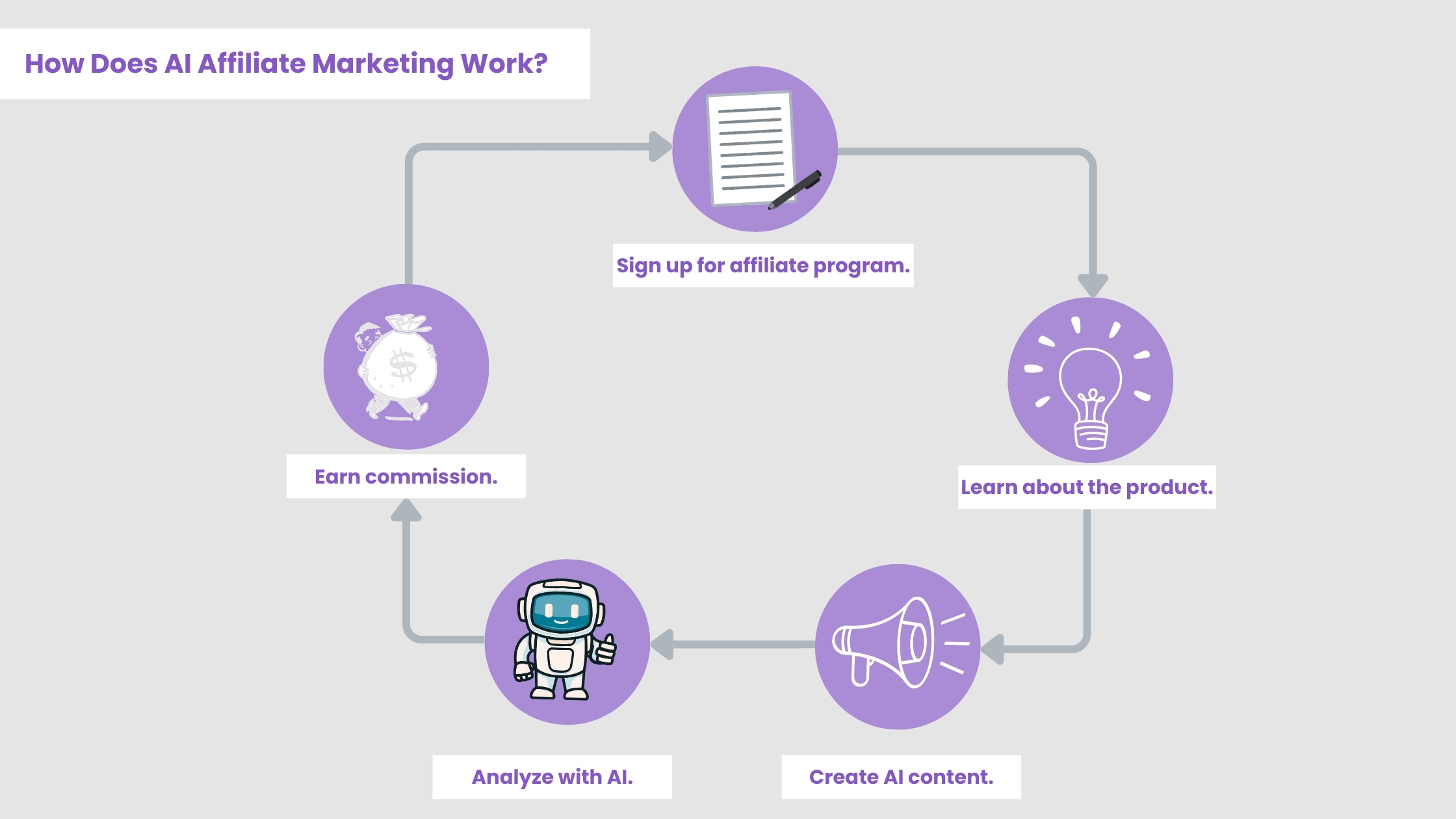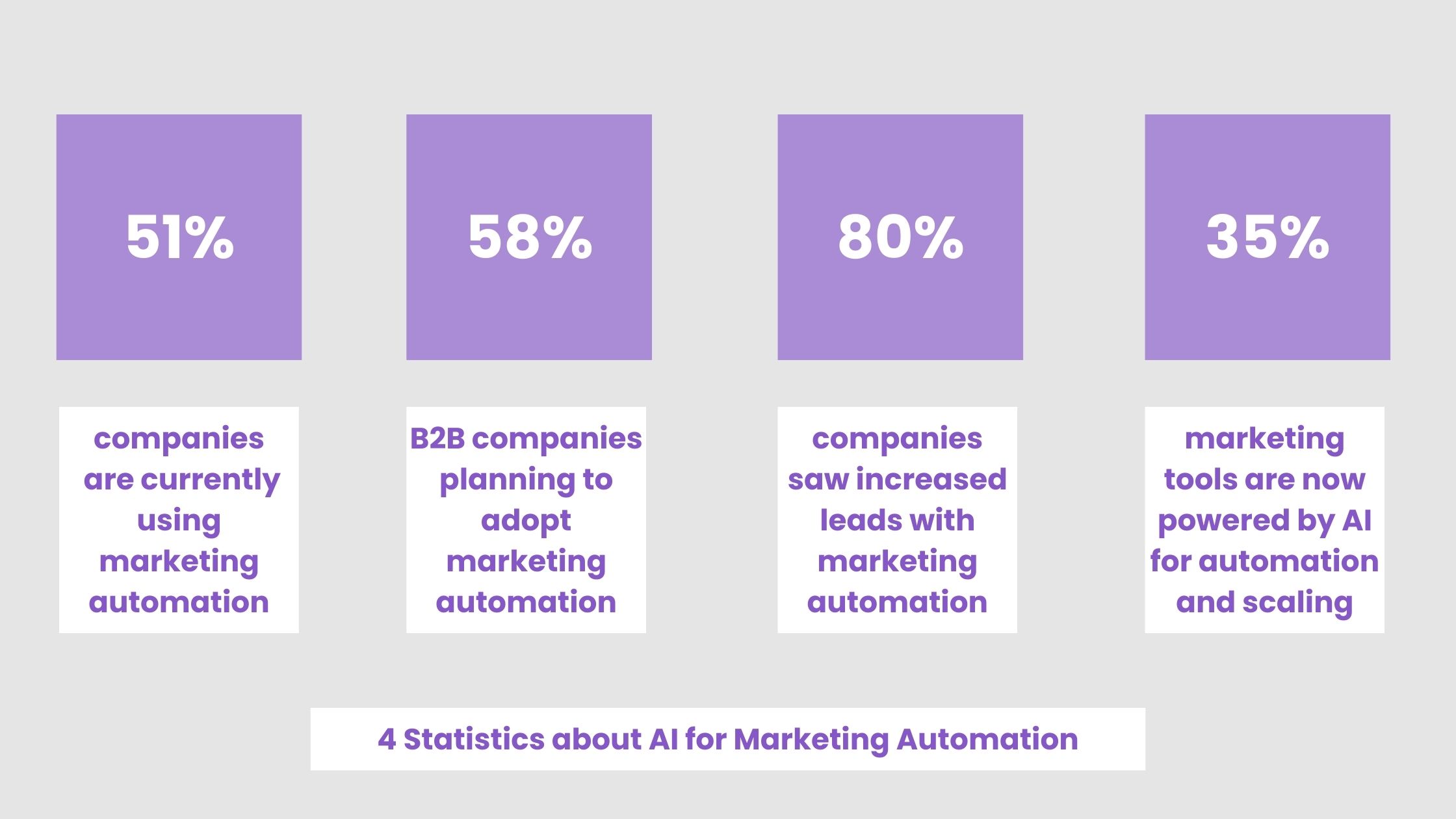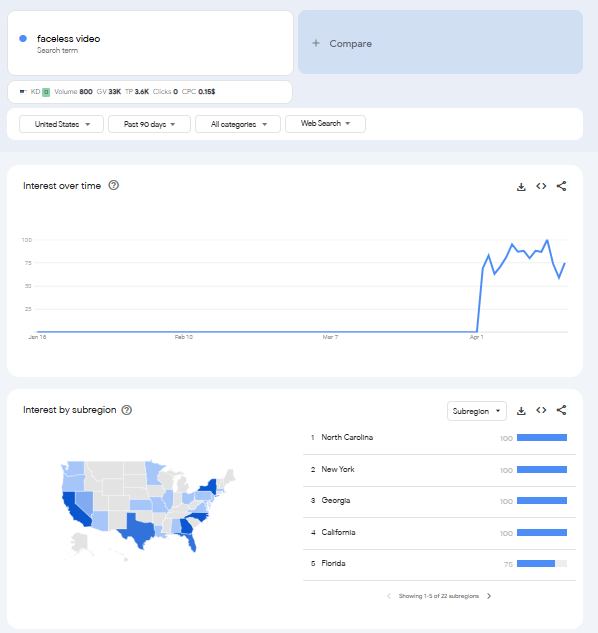
AI Affiliate Marketing Guide 101 | ImagineArt
Discover how AI affiliate marketing works, what tools to use, how to scale, and why ImagineArt offers the best affiliate opportunity for creators in 2025.

Sophia Felix
Wed Apr 16 2025
9 mins Read
According to Authority Hacker’s AI survey, 79.3% affiliate marketers have utilized AI. So, are you already using AI affiliate marketing for automation and scale? If yes, great! If no, here is the life-saving guide you need today to 5X your affiliate marketing efforts and income!
What is AI Affiliate Marketing?
AI Affiliate Marketing means to utilize AI tools for affiliate marketing activities: AI-powered content creation, editing, distribution, and analytics. It is simply an innovative fusion of traditional affiliate marketing strategies, for example persuasive content optimized for keywords, with the power of AI-led tools and automation.
In traditional affiliate marketing, affiliates earn commissions by promoting products or services, leverage content and targeted traffic to drive sales.
However, with the increasing complexity of online ecosystems and the vast amounts of data available, marketers now rely on AI technologies—such as machine learning, natural language processing (NLP), and predictive analytics—to optimize their strategies more efficiently than ever before.
This integration of artificial intelligence tools and models in affiliate marketing processes and workflows gives us ‘AI affiliate marketing’.
How AI Affiliate Marketing Works (And How to Get Started)
AI affiliate marketing integrates artificial intelligence tools into the traditional affiliate marketing model. Here's how it typically works:
1. Sign Up for an AI Affiliate Program
Join an AI affiliate program and get your unique referral link.
2. Learn about the product
First understand everything your AI product can do - for example, image generation, ai video generation, background removal, keyword research, ideation or music production. Before you start persuading others to subscribe to a specific product, you have to have a strong grip on the use cases. This is how your readers will trust your words and then follow you into buying your recommendations.
3. Promote product with text, visual and email content
Create content utilizing AI tools, for example Jasper and ImagineArt. Create different types of promotional materials that work for your niche, for example use case blogs, reviews, YouTube videos, Instagram reels, and email campaigns, all while embedding your referral link.
 How to do affiliatemMarketing with AI
How to do affiliatemMarketing with AI
Remember to choose your marketing platform wisely while considering the nature of your product and target audience. For example, AI video generators attract YouTubers and TikTokers, so go to these platforms and promote. Similarly, accounting software, like Xero, attracts small businesses and independent accountants more, which means you should go to LinkedIn.
4. Use AI to optimize promotion
Use AI tools to A/B test creatives, automate publishing and track performance. More on these tools in this list of AI tools for affiliate marketing.
5. Earn commission on conversions
When users purchase via your link, you earn a commission, e.g., ImagineArt gives you 50% when your audience purchases a subscription from your link.
Interested in more AI affiliate marketing resources? Check 38 AI Affiliate Programs and Imagine’s AI image generator affiliate program.
Benefits of AI Affiliate Marketing
AI affiliate marketing is already making strong financial contributions to the turnover of SaaS companies. From old players like HubSpot to new players like Clay, you’ll find LinkedIn posts and Instagram reels that promote these products and get a piece from the revenue - win-win, no? Here are top 8 benefits of AI affiliate marketing:
1. Automation
AI enables the automation of repetitive tasks such as data mining, performance tracking, and bid management.

There are hundreds of bots and AI agents that you can deploy in your content creation process and get tasks done in minutes. For example, Strapi has a content management system - which is strong yet publishing with it is time-consuming. But, publishing on Strapi can be automated. It takes files from your drive, let’s say, drafts the article and publishes it on schedule you desire!
2. Smarter Content Creation
With AI-powered content tools, affiliates can generate high-quality blog posts, product reviews, and social media updates. These tools create audience-specific content, for example they understand the tone you want, the language your audience likes, the fun element etc. These results are based on insights drawn from extensive data analysis.
3. Time-Saving
By automating tasks and organizing content creation and publishing workflows, AI dramatically reduces the time required to manage campaigns. When there is a new trend, or a fresh product, you don’t need days to create a campaign around it. Let’s say, with a tool like ChatGPT 4.0 which comes with a Deep Research feature, you can bring your research time from 4 hours to 30 minutes - and so for most of your other tasks.
4. Scaling Capabilities
When you have more time, you can focus on stuff that actually matters: mining new affiliate opportunities, outreaching, researching trends etc.
5. Improved Targeting
Using predictive analytics and machine learning, AI can segment audiences more precisely and deliver personalized messages that resonate with users. This enhanced targeting increases conversion rates and ROI.
6. Enhanced Analytics and Insights
AI tools can process vast datasets to uncover trends, measure campaign performance, and provide actionable insights. This depth of analytics allows for continuous optimization and better decision-making.
7. Personalization
AI can tailor content and advertisements to match the individual preferences of your audience. This not only increases engagement but also builds a more loyal customer base through highly relevant experiences.
8. Optimized Ad Spend
With improved targeting and real-time analytics, marketers can allocate budgets more effectively. AI systems assist in identifying high-performing channels and adjusting bids automatically to maximize ad spend efficiency.
How to Choose the Best Niches for AI Affiliate Marketing
There are tools you can use to identify profitable, trending markets with real demand. For example:
- Google Trends
- Exploding Topics
When you list down trends, focus on pain points where AI solves a clear problem.
 Google Trends for Research
Google Trends for Research
Top AI-Driven Product Niches:
- AI tools for content creators (e.g., image/video generation)
- AI for social media automation
- AI tools for solopreneurs (writing assistants, upscalers)
- AI tools for eCommerce and product visuals
All in all, choose niches that align with your website's vibe, content and audience - and your long-terms goals for your AI affiliate marketing business.
Best AI Tools for Affiliate Marketing
 AI Tools
AI Tools
AI SEO Techniques for Affiliate Marketing
Beyond tools, these are real techniques that use AI to help you rank higher, faster—especially useful if you’re promoting affiliate products in a competitive niche.
1. Semantic Topic Clustering
Use AI models like Frase or SurferSEO to group related keywords into themes. This lets you create cluster-based content that improves topical authority and internal linking structure.
2. Predictive Keyword Targeting
Use trend forecasting tools like Exploding Topics or Glimpse to target rising keywords before they peak. This is especially useful for AI tools, seasonal products, or newly launched features.
3. Dynamic FAQ Generation
Generate FAQs based on SERP “People Also Ask,” Reddit questions, and Quora threads using ChatGPT or Claude. Use FAQ schema to win rich snippets and voice search queries.
4. AI Rewrite & Refresh for Old Posts
Use AI to audit and rewrite aging blog posts. Keep the same URL, but rework intros, add updated use cases, and improve on-page structure to boost rankings without starting over.
5. Prompt Engineering for Featured Snippets
Craft clean, direct answers using prompt techniques in ChatGPT. Create definitions, pros/cons, and how-tos that match what Google highlights in its featured snippets.
6. SERP Analysis & Outline Reverse Engineering
Input the top-ranking pages into tools like NeuronWriter or Frase to extract headings and semantic gaps. Use this to build outlines that one-up the competition with additional depth and visuals.
7. Internal Linking Recommendations with AI
Use tools like LinkWhisper or in-house scripts powered by AI to analyze your blog and suggest relevant internal links. This supports crawlability, reduces bounce, and spreads authority.
8. Visual SEO with AI-Generated Graphics
Use ImagineArt to create custom, branded blog visuals—thumbnails, infographics, or section headers. These reduce bounce rate, improve engagement, and help earn backlinks naturally.
9. Meta Title & Description A/B Testing
Use AI to draft multiple versions of meta titles and descriptions, then run A/B tests using Google Search Console data or SEO plugins to improve CTR on indexed posts.
10. Optimize for AI Search Engines (Perplexity, ChatGPT, etc.)
AI-powered search engines are now major traffic drivers. Structure your content in concise, well-formatted answers. Use question-based headings and descriptive alt text so tools like ChatGPT, Perplexity, and You.com can cite your pages directly.
Trends in AI Affiliate Marketing
1. Hyper-Personalization
AI will enable even more granular personalization of marketing messages and content, tailoring recommendations and promotions to individual consumer preferences and behaviors.
2. Enhanced Predictive Analytics
The use of AI to predict market trends and consumer behavior will become more sophisticated, allowing affiliate marketers to proactively adjust their strategies.
3. Integration with Emerging Technologies
AI will increasingly integrate with other technologies such as augmented reality (AR) and virtual reality (VR) to create immersive marketing experiences.
4. Improved Fraud Detection
AI will play a crucial role in identifying and mitigating fraudulent activities within affiliate marketing, ensuring more secure and trustworthy operations.
Ethical Considerations in AI Affiliate Marketing
The integration of Artificial Intelligence (AI) into affiliate marketing introduces several ethical challenges that marketers must navigate to maintain trust and compliance.
1. Transparency and Honesty
AI enables the creation of highly personalized content, but it's imperative for marketers to disclose the use of AI in their campaigns. Transparent communication ensures that consumers are aware of AI's role, fostering trust and preventing potential deception. Misrepresentation, such as "AI washing"—exaggerating AI capabilities—can lead to regulatory scrutiny and damage brand reputation.
2. Data Privacy and Security
AI-driven marketing relies heavily on data collection and analysis. Marketers must handle consumer data responsibly, adhering to regulations like the General Data Protection Regulation (GDPR). Ensuring data is collected with consent, stored securely, and used ethically is paramount to protect consumer privacy and maintain credibility.
3. Algorithmic Bias and Fairness
AI systems can inadvertently perpetuate biases present in their training data, leading to unfair targeting or discrimination. Regular audits and the implementation of fairness measures are essential to mitigate bias, ensuring that marketing practices are equitable and inclusive.
4. Consumer Manipulation
The predictive capabilities of AI can be used to influence consumer behavior subtly. Marketers must balance persuasive strategies with ethical considerations, avoiding manipulative tactics that could exploit vulnerable consumers or lead to unintended consequences.
FAQs

Sophia Felix
Sophia Felix is an AI enthusiast and content marketer passionate about the way technology reshapes creativity and the human experience. She dives into the latest AI trends, making complex tech accessible and inspiring for everyone.